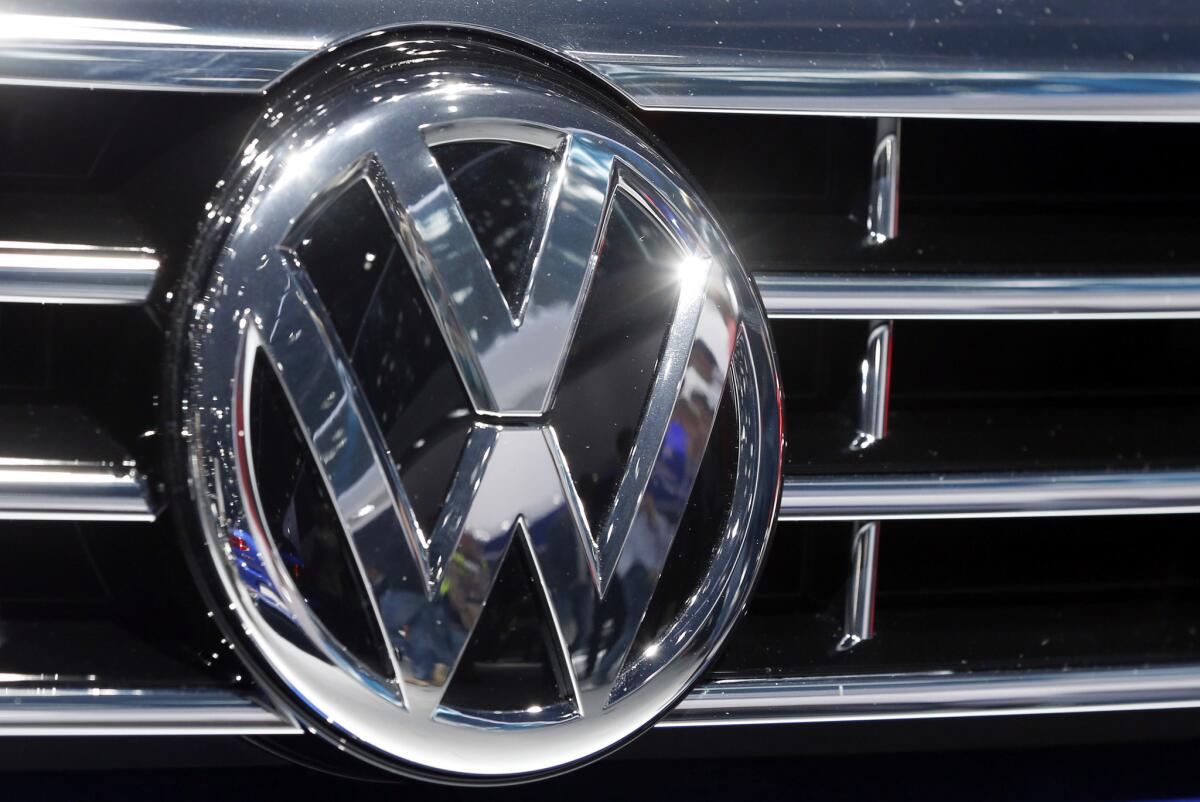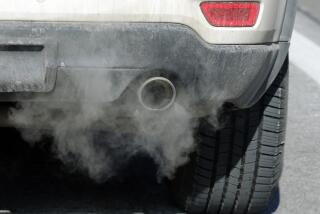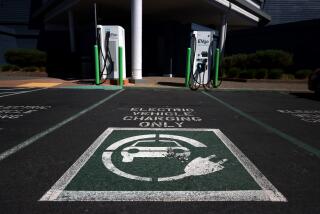U.S. government sues Volkswagen over cheating on emissions tests

The Volkswagen logo is displayed on a vehicle at the Car Show in Frankfurt, Germany, on Sept. 22, 2015.
- Share via
The U.S. Department of Justice filed a civil complaint Monday against Volkswagen over its sale of vehicles that used software to cheat on U.S. emissions tests, sharply turning up the heat on the German automaker.
The complaint, filed in federal court in Detroit on behalf of the U.S. Environmental Protection Agency, accused Volkswagen of violating federal law by installing the illegal software on 580,000 cars.
A total penalty amount was not stated, but the lawsuit says VW is liable for up to $32,500 or $37,500 per vehicle depending on the time of the violation. That could total more than $18 billion in fines, though it’s unclear if the government would demand such a total.
However, the threat of such a fine will put pressure on the automaker to come up with a solution for fixing the vehicles, which were discovered in September to spew as much as 40 times the legal limit of nitrogen oxides in normal driving.
“This ups the ante pretty significantly,” said Jack Nerad, executive market analyst at Kelley Blue Book. “This might be a little kick to get it to do something.”
The largest fine ever paid by an automaker was in 2014 when the Justice Department ordered Toyota Motor Corp. to pay $1.2 billion in a criminal settlement over sudden acceleration in some of its vehicles. More recently, General Motors Co. paid $595 million last year from a legal fund to compensate victims affected by faulty ignition switches in some cars.
VW has admitted to using the “defeat devices” in about 11 million vehicles worldwide. The devices detect when a vehicle is being tested and lower engine performance to reduce pollution.
Monday’s complaint alleges that the illegal software was installed in the U.S. in about 500,000 2.0-liter vehicles — including some Jetta, Beetle, Golf and Passat models — and 80,000 3.0-liter vehicles, which includes various Audi models and a Porsche SUV. Model years run from 2009 to as late as this year. The company’s Audi and Porsche subsidiaries also are named in the lawsuit.
The complaint specifically accuses the automaker of violating the Clean Air Act by selling and importing vehicles that were designed differently from what VW had stated in certification applications to the EPA and the California Air Resources Board.
“So far, recall discussions with the company have not produced an acceptable way forward. These discussions will continue in parallel with the federal court,” said Cynthia Giles, assistant administrator for enforcement and compliance assurance at EPA, in a statement. “With today’s filing, we take an important step to protect public health by seeking to hold Volkswagen accountable for any unlawful air pollution, setting us on a path to resolution.”
The Department of Justice said the civil complaint does not preclude the government from seeking other legal remedies, including criminal action. The lawsuit notably accuses the company of providing “misleading” information and obstructing the government’s probe into the matter.
The U.S. attorney’s office in Detroit said it was involved in a parallel criminal investigation of VW, and regulators across the globe have also launched inquiries.
VW said it will continue to work with the EPA and other government agencies to devise a remedy and bring the vehicles into compliance as soon as possible. The automaker also said it is working with American attorney Kenneth Feinberg to create “an independent, fair and swift process for resolving private consumer claims relating to these issues.”
The emissions scandal broke in September when the California Air Resources Board and the EPA said they had found that VW had installed illegal software known as “defeat devices” in certain 2.0-liter diesel vehicles. In November, the Environmental Protection Agency issued another notice of violation about certain vehicles with 3.0-liter engines.
The company has admitted the problems stem from an effort launched in 2005 to gain a bigger market share in the U.S. market. Plans went awry when the company was unable to develop emissions-control technology that met U.S. standards within their budget and deadline.
The scandal has already led to changes at the automaker’s headquarters. Longtime company Chief Executive Martin Winterkorn resigned in September and was replaced by Porsche executive Matthias Mueller. VW has also suspended nine managers who were possibly involved in the scandal. The company has said it believes the emissions cheating was the work of a small number of employees.
In November, VW proposed a recall plan for 2.0-liter diesel vehicles to the California Air Resources Board. The board has said it would act on the proposal on or before Jan. 14.
To increase consumer confidence, the company also said last month that it would implement new and more stringent emissions testing for all of its vehicles and would have an independent third-party verify those tests.
But VW already faces hundreds of class-action lawsuits, which have been consolidated in San Francisco because of the multitude of VW owners and dealers in the state.
The Department of Justice said Monday that it will look to transfer its case to the Northern District of California to “fully participate” in the pretrial proceedings of related multi-district litigation.
It filed the case in Michigan because that is where Volkswagen of America has an office.
Jamie Court, president of Santa Monica-based Consumer Watchdog, applauded Monday’s legal actions, saying the government is “firing on all cylinders.”
“Volkswagen owners got taken to the bank by Volkswagen’s lie, but we all had our air quality diminished in ways that Volkswagen has to pay for,” he said.
The Associated Press contributed to this report.
More to Read
Inside the business of entertainment
The Wide Shot brings you news, analysis and insights on everything from streaming wars to production — and what it all means for the future.
You may occasionally receive promotional content from the Los Angeles Times.











